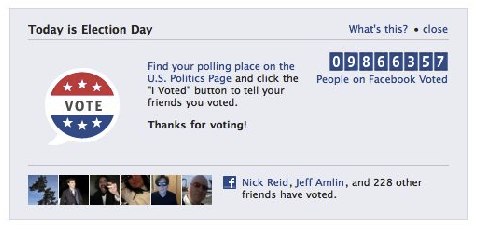Facebook's election data: some insight, but too limited to be credible

I tend to be a bit of a data nut sometimes, looking for trends and stories within the results of surveys and so on. That's why I was excited to see a running tally of Facebook members who had voted on Election Day in the U.S. - as well as my friends who had proudly clicked the "I voted" button for an "I voted" badge on their walls. I just knew Facebook would be tallying some numbers and share the trends it had seen.

You see, my wife couldn't get to our neighborhood polling place until the end of her work day. But that blasted Facebook popup window about voting kept appearing on the screen during the day. At some point during the day, she closed that window, not realizing that once she dismissed it, it would never come back - and she would never be allowed to display her "I voted" badge.
She hit the polling place around 6 p.m. and logged into Facebook when she got home - ready to proudly "wear" her badge like many of her friends had already done. (Plus, she had been encouraging people to remember to vote so she wanted to show that she had also gone to the polls.)
But she couldn't get the badge window back. She searched the Facebook Help forums but the only thing that came up were other badges created by Facebook groups - not the official one. She searched the wall posts of other users to see if anyone knew how to find the badge but all she came up with was inquiries from other people who were in the exact same boat. She even did a general Web search on how to restore this Facebook badge - but it was just more of the same.
In the end, she typed "I voted" into her status and let it go.
When it comes to elections, there's nothing really scientific about the TV exit polls because they're based on a small sampling of people and they're biased based on who was asked and where the person was asked. I'm sure that a 23-year-old student at University of California, Berkeley probably voted different than a retiree in rural Kentucky.
But Facebook, with a membership base of 500 million people - some of whom are obviously not eligible to vote - had the potential to more accurately gauge the potential results because the demographics and geographies of people on Facebook are so diverse.
Instead, what we got was some interesting insight, but nothing I would report as fact. How skewed was the data? How many people closed the "I Voted" window and couldn't back to it when they finally cast their votes? How many searches for "Facebook's I Voted button" were conducted?
Sure, Facebook's insight was still probably better than anything being offered by network television - but it had the potential to be so much more. Oh well, lessons learned, right? Maybe Facebook can take this input, rethink how the site can offer a greater snapshot of trends around key issues and come back during the next election as the ultimate exit poll data provider.
It had the potential this year - but just fell short.
Oh, in case you are interested in some of Facebook's data, the company has put up a post with some anecdotal data - such as voter turnout among San Francisco Giants fans versus Texas Rangers fans.
I bet that's a question that CNN wasn't asking on Election Night.